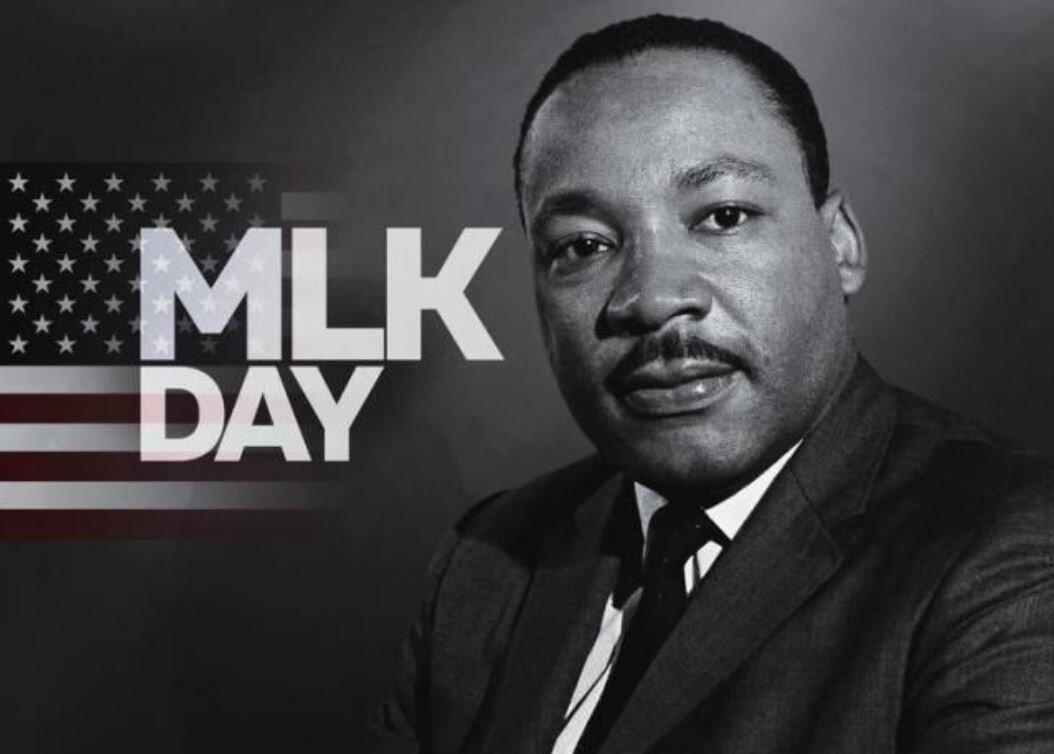Honoring MLK Jr's Legacy: A Year-Long Celebration

On the third Monday of every January, the United States observes Martin Luther King Jr. Day, a federal holiday dedicated to honoring the life and legacy of one of the most influential civil rights leaders in American history. While this annual observance is an important reminder of Dr. King's impact, there is so much more to explore and celebrate throughout the year. This comprehensive guide aims to delve deeper into the life, work, and enduring influence of Martin Luther King Jr., providing a year-long journey of exploration and appreciation.
Understanding the Man and His Mission

Martin Luther King Jr., born Michael King Jr. on January 15, 1929, in Atlanta, Georgia, was a pivotal figure in the American civil rights movement. His journey began as a young boy, experiencing the harsh realities of racial segregation and injustice in the Deep South. Despite the challenges, King excelled academically, earning a Bachelor of Arts degree in sociology from Morehouse College, a historically black college, at the age of 19.
King's pursuit of higher education continued as he attended Crozer Theological Seminary in Pennsylvania, where he not only earned a Bachelor of Divinity degree but also immersed himself in the writings of Mahatma Gandhi, whose philosophy of nonviolent resistance deeply influenced King's own approach to social change.
In 1954, King became the pastor of the Dexter Avenue Baptist Church in Montgomery, Alabama. It was here that his journey as a civil rights leader truly began. The Montgomery Bus Boycott, sparked by the refusal of Rosa Parks to give up her seat to a white passenger, marked a turning point. King's leadership during this boycott, which lasted over a year, brought him national attention and established him as a prominent voice in the civil rights movement.
Throughout his life, King advocated for racial equality and social justice through peaceful means, drawing inspiration from his Christian faith and the principles of Gandhi. His iconic "I Have a Dream" speech, delivered during the 1963 March on Washington, remains a powerful testament to his vision of a society free from racial discrimination.
Exploring the Year-Long Celebration

While Martin Luther King Jr. Day serves as a national day of recognition, there are countless opportunities to celebrate and reflect on King’s legacy throughout the year. Here’s a calendar of ideas and events to keep the spirit of his work alive all 365 days:
January: Reflecting on King’s Birth and Legacy
- Start the year by attending local Martin Luther King Jr. Day parades, speeches, or community service events. These gatherings provide an opportunity to connect with others and reflect on King’s impact.
- Host a film screening of documentaries or movies that depict the civil rights movement, followed by a discussion on King’s role and the challenges faced by activists during that era.
- Organize a community reading of King’s speeches and writings, inviting participants to share their reflections on the relevance of his words in today’s society.
February: Black History Month
- Celebrate Black History Month by focusing on the achievements and struggles of African Americans throughout history. Include King’s contributions as a central theme, exploring his role in the civil rights movement and his impact on society.
- Visit museums or historical sites that showcase the civil rights movement, such as the National Civil Rights Museum in Memphis, Tennessee, or the Martin Luther King Jr. National Historical Park in Atlanta, Georgia.
- Engage in conversations or organize workshops that explore the intersection of race, justice, and equality, drawing inspiration from King’s teachings.
March: A Time for Action and Remembrance
- Mark the anniversary of the March on Washington by hosting a commemorative event or participating in local marches or protests that advocate for social justice and equality.
- Explore King’s connection to nonviolent resistance by studying his philosophy and the tactics he employed during the civil rights movement. Discuss the relevance of these strategies in contemporary social movements.
- Visit or volunteer at organizations that continue King’s legacy, such as the Southern Christian Leadership Conference (SCLC) or local community centers dedicated to social justice and civil rights.
April: Remembering King’s Final Days
- On April 4, observe a moment of silence to honor the day King was assassinated in 1968. Reflect on his life and the unfinished work he left behind.
- Explore King’s final years and his work on economic justice and the Poor People’s Campaign. Discuss the relevance of these issues in contemporary society and how they continue to shape social movements.
- Host a discussion or workshop on civil disobedience and the role it plays in achieving social change. Use King’s teachings and experiences as a foundation for exploring these concepts.
May: Celebrating King’s Impact on Education
- Organize a scholarship program or award ceremony that recognizes and supports students who embody King’s ideals of leadership, social justice, and academic excellence.
- Host a book drive or donate educational resources to local schools, honoring King’s belief in the power of education to create a more just society.
- Invite speakers or organize panel discussions focused on the role of education in fostering social change, drawing inspiration from King’s own educational journey.
June: Exploring King’s Global Impact
- Host a cultural exchange program or invite speakers from diverse backgrounds to share how King’s legacy has influenced social movements and civil rights struggles around the world.
- Organize a global film festival featuring documentaries or movies that depict social justice movements inspired by King’s nonviolent resistance philosophy.
- Engage in discussions or workshops that explore the interconnectedness of social justice issues globally, using King’s teachings as a lens to understand and address these challenges.
July: A Month of Community Building
- Organize community clean-up drives or service projects that embody King’s vision of building a better society through collective action.
- Host a neighborhood potluck or cultural festival that celebrates diversity and fosters community building, echoing King’s belief in the power of unity.
- Initiate or support local initiatives that address social issues, such as poverty, housing, or racial disparities, in the spirit of King’s commitment to social justice.
August: Honoring King’s Faith and Spirituality
- Explore King’s deep connection to his Christian faith by organizing interfaith dialogue events or hosting discussions on the role of religion in social justice movements.
- Visit or support local churches or religious organizations that embody King’s teachings and continue his legacy of social activism.
- Organize spiritual retreats or workshops that focus on inner reflection and the role of spirituality in social change, drawing from King’s own spiritual practices.
September: Celebrating King’s Impact on Labor and Workers’ Rights
- Mark Labor Day by hosting events or discussions that highlight King’s involvement in the labor movement and his advocacy for workers’ rights.
- Collaborate with local unions or worker-rights organizations to raise awareness about the ongoing struggles for fair wages, safe working conditions, and labor rights, in line with King’s vision.
- Initiate or support initiatives that provide resources or support to workers facing challenges, such as job training programs or legal aid services.
October: A Month of Education and Advocacy
- Host educational workshops or seminars that delve into the history of the civil rights movement, King’s leadership, and the ongoing fight for racial equality.
- Engage in advocacy efforts by participating in local campaigns or initiatives that address racial disparities in education, housing, or criminal justice.
- Organize or support voter registration drives, emphasizing the importance of civic engagement and the power of the vote in shaping a more just society, as King advocated.
November: Reflecting on King’s Vision for a Just Society
- Organize community forums or panel discussions that explore contemporary social issues and how they relate to King’s vision of a just and equitable society.
- Host film screenings or book readings that depict stories of social change and the impact of individual actions, drawing inspiration from King’s example.
- Engage in dialogue or workshops that encourage critical thinking about the role of individuals in creating a more just world, based on King’s teachings.
December: A Time for Reflection and Renewal
- As the year comes to a close, host a community gathering or service project that reflects on the year’s achievements and sets intentions for the coming year, inspired by King’s legacy.
- Organize a tree-planting initiative or an environmental awareness campaign, honoring King’s commitment to the interconnectedness of all life and the importance of environmental justice.
- Encourage individuals to set personal goals for social engagement and advocacy, inspired by King’s life and work.
The Enduring Impact of Martin Luther King Jr.
Martin Luther King Jr.’s legacy extends far beyond the boundaries of time and space. His vision of a world free from racial discrimination, his advocacy for nonviolent resistance, and his unwavering commitment to social justice continue to inspire generations. As we celebrate his life and work throughout the year, we are reminded of the power of individual action and the collective responsibility to create a more just and equitable society.
By exploring King's legacy in depth and engaging in meaningful conversations and actions, we not only honor his memory but also ensure that his dream lives on, guiding us towards a brighter future.
| Month | Key Events and Celebrations |
|---|---|
| January | Martin Luther King Jr. Day, film screenings, community readings |
| February | Black History Month, museum visits, workshops on race and justice |
| March | March on Washington anniversary, discussions on civil disobedience |
| April | Remembrance of King's assassination, exploring his work on economic justice |
| May | Scholarship programs, book drives, discussions on education and social change |
| June | Cultural exchanges, global film festivals, global social justice discussions |
| July | Community clean-ups, cultural festivals, local social initiatives |
| August | Interfaith dialogues, spiritual retreats, support for local churches |
| September | Labor Day events, worker-rights advocacy, job training initiatives |
| October | Educational workshops, advocacy campaigns, voter registration drives |
| November | Community forums, film screenings, dialogue on social change |
| December | Community gatherings, environmental initiatives, personal goal-setting |

What is the significance of Martin Luther King Jr. Day beyond a federal holiday?
+
Martin Luther King Jr. Day serves as a reminder of the ongoing struggle for racial equality and social justice. It provides an opportunity for individuals and communities to reflect on King’s legacy, engage in meaningful conversations, and take action towards creating a more just society.
How can we incorporate King’s teachings into our daily lives?
+
King’s teachings on nonviolent resistance, love, and the power of collective action can guide our personal and social interactions. By embracing these principles, we can foster understanding, promote equality, and work towards creating a more peaceful and just world.
What is the impact of King’s legacy on contemporary social movements?
+
King’s legacy continues to inspire and shape contemporary social movements. His strategies of nonviolent resistance, his emphasis on love and unity, and his unwavering commitment to justice provide a blueprint for activists and advocates working towards social change in various fields, from racial equality to environmental justice.



